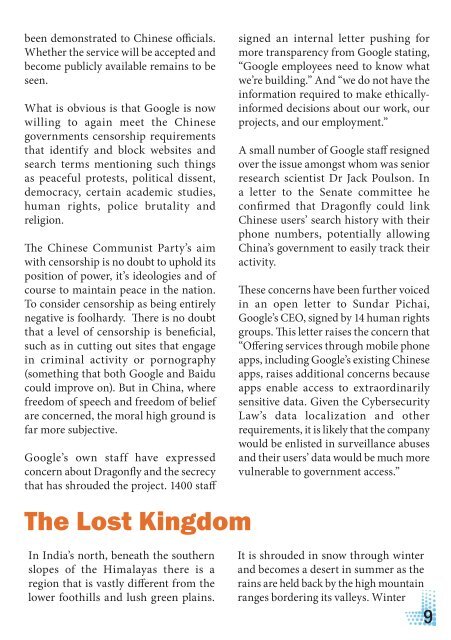UK November 2018
You also want an ePaper? Increase the reach of your titles
YUMPU automatically turns print PDFs into web optimized ePapers that Google loves.
een demonstrated to Chinese officials.<br />
Whether the service will be accepted and<br />
become publicly available remains to be<br />
seen.<br />
What is obvious is that Google is now<br />
willing to again meet the Chinese<br />
governments censorship requirements<br />
that identify and block websites and<br />
search terms mentioning such things<br />
as peaceful protests, political dissent,<br />
democracy, certain academic studies,<br />
human rights, police brutality and<br />
religion.<br />
The Chinese Communist Party’s aim<br />
with censorship is no doubt to uphold its<br />
position of power, it’s ideologies and of<br />
course to maintain peace in the nation.<br />
To consider censorship as being entirely<br />
negative is foolhardy. There is no doubt<br />
that a level of censorship is beneficial,<br />
such as in cutting out sites that engage<br />
in criminal activity or pornography<br />
(something that both Google and Baidu<br />
could improve on). But in China, where<br />
freedom of speech and freedom of belief<br />
are concerned, the moral high ground is<br />
far more subjective.<br />
Google’s own staff have expressed<br />
concern about Dragonfly and the secrecy<br />
that has shrouded the project. 1400 staff<br />
The Lost Kingdom<br />
signed an internal letter pushing for<br />
more transparency from Google stating,<br />
“Google employees need to know what<br />
we’re building.” And “we do not have the<br />
information required to make ethicallyinformed<br />
decisions about our work, our<br />
projects, and our employment.”<br />
A small number of Google staff resigned<br />
over the issue amongst whom was senior<br />
research scientist Dr Jack Poulson. In<br />
a letter to the Senate committee he<br />
confirmed that Dragonfly could link<br />
Chinese users’ search history with their<br />
phone numbers, potentially allowing<br />
China’s government to easily track their<br />
activity.<br />
These concerns have been further voiced<br />
in an open letter to Sundar Pichai,<br />
Google’s CEO, signed by 14 human rights<br />
groups. This letter raises the concern that<br />
“Offering services through mobile phone<br />
apps, including Google’s existing Chinese<br />
apps, raises additional concerns because<br />
apps enable access to extraordinarily<br />
sensitive data. Given the Cybersecurity<br />
Law’s data localization and other<br />
requirements, it is likely that the company<br />
would be enlisted in surveillance abuses<br />
and their users’ data would be much more<br />
vulnerable to government access.”<br />
In India’s north, beneath the southern<br />
slopes of the Himalayas there is a<br />
region that is vastly different from the<br />
lower foothills and lush green plains.<br />
It is shrouded in snow through winter<br />
and becomes a desert in summer as the<br />
rains are held back by the high mountain<br />
ranges bordering its valleys. Winter<br />
9

















